If you’ve heard people talking about “two Social Security checks in December,” here’s the clear, no-nonsense version: most retirees and disability beneficiaries will not get two Social Security payments in December, but many SSI recipients will see two deposits one on December 1 for the December benefit and another on December 31, which is actually the January SSI paid early because January 1 is a federal holiday. It’s not extra money; it’s a calendar shift designed to keep benefits on time.

The phrase two Social Security checks in December trips people up because it mixes two different programs: Social Security (retirement, survivors, SSDI) and SSI. Social Security follows a Wednesday-based schedule tied to birthdates or a special third-of-the-month group, while SSI pays on the first of the month. When the first is a weekend or federal holiday, the next month’s SSI pays the prior business day—so January’s SSI arrives on December 31 this year. That’s why many SSI recipients see two deposits in December, even though the second belongs to January.
Social Security Checks
| What Happens | Who It Affects | What It Really Is | Key December Date |
|---|---|---|---|
| December SSI posts | SSI recipients | Regular December benefit | December 1, 2025 |
| Early January SSI posts in December | SSI recipients | January 2026 SSI paid early due to holiday | December 31, 2025 |
| Social Security third-of-the-month group | Pre-1997 filers, some dual recipients, certain exceptions | Regular Social Security payment | December 3, 2025 |
| Social Security by birthdate (1–10) | Retirees/SSDI/survivors | Regular Social Security payment | December 10, 2025 |
| Social Security by birthdate (11–20) | Retirees/SSDI/survivors | Regular Social Security payment | December 17, 2025 |
| Social Security by birthdate (21–31) | Retirees/SSDI/survivors | Regular Social Security payment | December 24, 2025 |
The buzz about two Social Security checks in December mostly applies to SSI. If you receive SSI, you’ll see your regular December 1 payment and then your January SSI a day early on December 31 due to the New Year’s holiday. If you’re on Social Security only, expect your usual single December payment on your assigned Wednesday or on December 3 if you’re paid on the third. To keep your budget accurate, treat the December 31 SSI as January income, watch for your COLA-adjusted amount with January benefits, and verify dates in your account so there are no surprises.
Why Two Payments Appear in December
SSI is structured to pay on the first of each month. When that date is a federal holiday or weekend, the deposit moves to the prior business day so recipients aren’t left waiting. With New Year’s Day being a federal holiday, the January SSI is advanced to December 31. That shows up as “two payments” in December, even though the second one is simply next month’s check arriving early. Your annual total doesn’t change, and there’s no bonus involved.
Who Actually Gets Two Payments
- SSI-only recipients: Expect your December SSI on December 1 and your January SSI early on December 31. That’s the classic two-in-December scenario.
- People who receive both SSI and Social Security: You may see an SSI on December 1, a Social Security payment on December 3 if you’re paid on the third, and the early January SSI on December 31. It looks like more activity, but it’s normal timing one of those deposits is just January’s SSI arriving a day early.
Who Does Not Get Two Social Security Checks
- Retirees, SSDI, and survivors who don’t receive SSI will get one December Social Security payment based on the Wednesday schedule that matches their birthdate group. There’s no automatic second Social Security payment in December for those beneficiaries.
- The Wednesday pattern remains: December 10 for birthdays 1–10, December 17 for birthdays 11–20, and December 24 for birthdays 21–31. A separate third-of-the-month group is paid December 3.
Key Dates You Should Know
- December 1: December SSI payment.
- December 3: Social Security for those paid on the third (pre-1997 filers, certain dual recipients, and other exceptions).
- December 10, 17, 24: Regular Social Security payments aligned to birthdate ranges across the second, third, and fourth Wednesdays.
- December 31: January 2026 SSI paid early due to the New Year’s Day holiday.
How COLA Shows Up Between December and January
The 2026 cost-of-living adjustment applies to January benefits. For SSI recipients, that new amount appears with the early January SSI that lands on December 31, so your updated benefit shows up at the end of December. For Social Security retirement, disability, and survivors’ beneficiaries, the increased amount appears with the January 2026 payment on your normal schedule. That’s why some people notice the COLA earlier SSI’s January benefit is simply delivered a day early.
What To Do If a Payment Is Late
- Check your category and date: Confirm whether you’re in the third-of-the-month group, which Wednesday applies to your birthdate, or whether you receive SSI. Make sure you’re looking at the right line on the schedule.
- Allow the posting window: Paper checks can take a few extra mailing days. Direct deposit can post at different times depending on the bank or card program.
- Call in the right order: If the date has passed and funds haven’t posted, contact your bank or card issuer first to rule out a posting delay; then contact Social Security to report a missing payment.
Common Misconceptions to Avoid
- “Two checks in December means a bonus.” No, if you’re seeing two deposits and you have SSI, the second is January’s SSI paid early because of the holiday. Annual totals don’t change.
- “All Social Security recipients get two payments.” Not true. Most people on Social Security retirement, SSDI, or survivors benefits who don’t receive SSI will get just one December payment according to their Wednesday cycle. The two-in-December scenario largely applies to SSI.
How This Affects Budgeting And Bills
Seeing two deposits can throw off monthly planning if you treat both as December income. A practical approach is to earmark the December 31 deposit for January expenses since it’s January’s SSI. If you’re on Social Security only, plan around your single December deposit date and your January date with the COLA increase. Marking these dates on a calendar and labeling the early SSI as “January” helps keep your cash flow clean.
Direct Deposit Vs. Paper Checks
Direct deposit is the most reliable way to avoid delays and confusion, since funds typically arrive faster and are less affected by mail timing. If you still use paper checks, build in at least three mailing days after the scheduled date before escalating. Consider switching to direct deposit or a Treasury-approved card to minimize disruptions around holidays and post office congestion.
How To Verify Your Schedule for Two Social Security Checks in December
Create or sign in to my Social Security account to view your benefit type and verify your expected pay dates. This is also where you can update direct deposit details, check any notices, and review benefit amounts especially helpful around COLA changes and year-end timing quirks.
What If You Receive Multiple Benefits
If you receive SSI and Social Security, expect separate deposits that may land on different dates. Track them separately:
- SSI: December 1 and December 31 (January’s benefit early).
- Social Security: Either December 3 (third-of-the-month group) or your assigned Wednesday based on your birthdate. Treat the December 31 SSI as January income in your budget.
Scams And Safety Around Payment Dates
Year-end is prime time for phishing and impostor scams. Social Security will not call to demand payment, threaten arrest, or request your bank login. If someone claims a “December bonus,” hang up and contact Social Security through official channels. Monitor your bank or prepaid card for unexpected withdrawals; enable alerts to catch suspicious activity immediately.
Tax And Reporting Considerations
Receiving January’s SSI on December 31 doesn’t change the benefit’s identity it’s still January’s payment. For accounting and planning, treat it as January income. Social Security benefits and SSI have different tax treatment, and SSI itself isn’t taxable, but lumping the early payment into December spending can cloud your monthly view. Keep a simple log of which deposit covers which month to avoid confusion when reviewing statements.
FAQs on Social Security Checks
Will everyone get two Social Security checks in December?
No. Most people on Social Security retirement, SSDI, or survivors benefits get one payment in December. The two-in-December situation mainly applies to SSI, which pays on December 1 and then pays January’s benefit early on December 31.
Does the early SSI on December 31 mean I got extra money?
No. The December 31 deposit is January’s SSI delivered early because of the holiday. Your yearly total is the same, and February’s SSI will arrive on February 1 if it’s a business day.
I get both SSI and Social Security how many payments should I expect?
Typically three separate events across the month: SSI on December 1, Social Security either on December 3 (if you’re in the third-of-the-month group) or on your assigned Wednesday by birthdate, and the early January SSI on December 31.
When will the COLA increase show up?
For SSI, the COLA applies to January’s benefit, which you receive early on December 31. For Social Security, the increased amount shows up with your January payment on your standard schedule.






